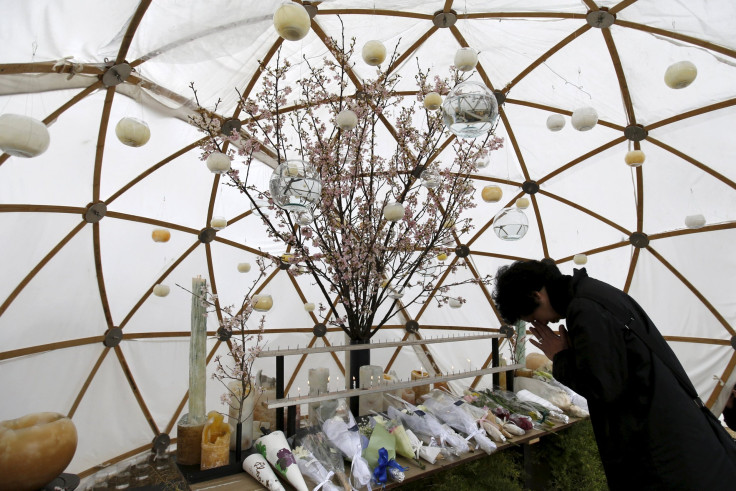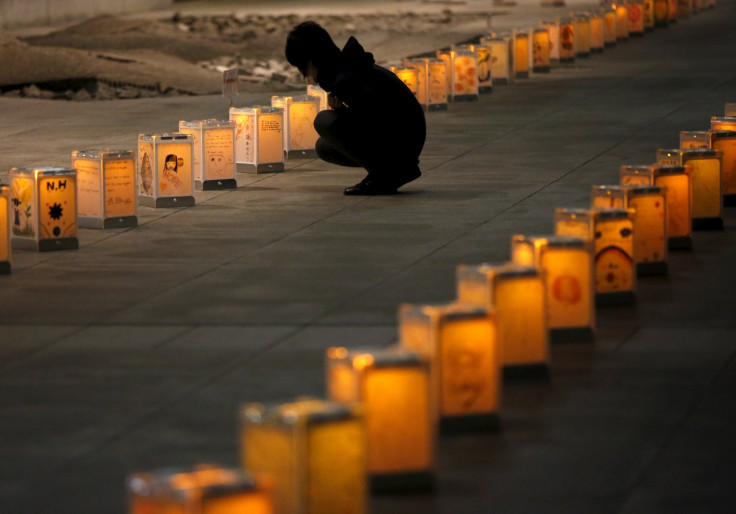Japan, Five Years After March 11 Tsunami: Moment Of Silence Observed As Country Remembers Devastation [PHOTOS]

Japan on Friday marked the fifth anniversary of the 2011 tsunami that claimed more than 18,000 lives and sparked the worst nuclear disaster in a quarter century. A magnitude-9.0 quake hit Japan, creating a giant wall of water that devastated the country’s northeastern part.
Memorial services were held across Japan, with a moment of silence at 2.46 p.m., local time, (12:46 a.m. EST), the same time the quake struck under the Pacific Ocean on March 11, 2011. Prime Minister Shinzo Abe and Emperor Akihito reportedly offered flowers at a national memorial ceremony in Tokyo.
"Many people are still leading uncomfortable lives in the affected areas. There are many who cannot return to their beloved homes because of the accident at the nuclear power plant," Abe reportedly said at the ceremony. "We commit ourselves to ... providing care for their minds and bodies, forming new local communities and supporting industrial development of the affected areas."

The massive earthquake and the devastating tsunami triggered the Fukushima Daiichi nuclear plant disaster, as the waves swamped power supplies at the plant causing a series of reactor meltdowns that released radiation over a wide area of the countryside, contaminating water, food and air. After the nuclear disaster, which was the worst since Chernobyl, Ukraine, in 1986, all nuclear power plants in the country were shut down, and only a few have since been restarted.
On the eve of the anniversary, Abe pledged to strengthen reconstruction efforts ahead of the 2020 Tokyo Olympic Games.
He also promised that he will speed up decontamination work in irradiated areas near the Fukushima nuclear plant to allow more residents to return home safely.
"We plan to secure an ample budget to launch support measures to help disaster-hit areas stand on their feet again," Abe said, according to the Associated Press.

The government has spent billions of dollars on reconstruction work since the devastation, but much remains to be done. Takagi Tsuyoshi, Japan's minister of reconstruction, vowed that the work would be completed.
"Rehabilitation and reconstruction have reached a certain level in terms of 'hardware,' but there is still a lack of 'software.' We will attend to both aspects in the future, and achieve total reconstruction within the next five years," he promised, BBC reported.
The disaster forced Japan to turn to expensive fossil fuels to plug the energy gap left by the shutdown of its nuclear plants. Abe said Thursday that the country "cannot do without" nuclear power, but vowed to reduce dependence on it.

“It is extremely difficult to access the inside of the nuclear plant," Naohiro Masuda, the head of decommissioning for the plant's operator, Tokyo Electric Power Co. (Tepco), said in an interview with Reuters. "The biggest obstacle is the radiation.”
Tepco is building giant seawalls to keep groundwater from flowing into the basements of the damaged reactors and getting contaminated.
© Copyright IBTimes 2024. All rights reserved.





















